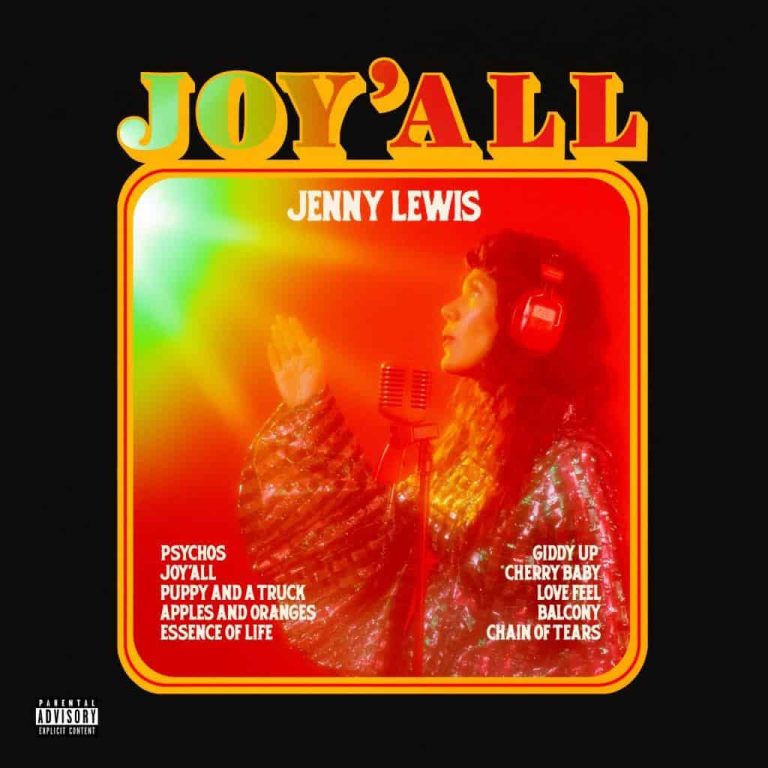There certainly is something to be said for kicking back, sipping a fruity cocktail, and just shooting the breeze. That lowkey, laid back attitude seems to be what singer-songwriter Jenny Lewis is going for on her fifth solo record, Joy’All, an album that feels worlds removed from the thorny emo-adjacent rock magic she conjured with her band Rilo Kiley in the 2000s, and even shows quite a leap away from the country-tinged solo albums she put out once that band dissolved. But somewhere along the line — starting with 2014’s The Voyager and doubling down on 2019’s On the Line — Lewis decided she wanted to take it all just a little bit easier, a little bit smoother, a little sillier.
Lewis has always been one of indie rock’s sharpest and cleverest songwriters. She has a knack for the kind of wordplay that lands in your head like gum but also guts your intestines like a dive knife. It’s impossible to forget her yearning, impossibly moving “You say I choose sadness / That it never once has chosen me” only to be followed up with the spoken-with-a-shrug “Maybe you’re right.” And yet, on her most recent solo material, and especially on this new LP, the deep-diving and emotionally-excavating Lewis of yore seems to have taken a bit of a backseat, making way for the margarita-swigging Nashville vibe-spinner.
And on paper, that’s ok. Lewis has done the time and cemented her place in the indie iconography. Her honeyed voice has matured and grown stronger, more emotive, over time, and she’s penned so many lasting songs. She can, for lack of better words (and in words that really, of course, go without saying), do whatever she wants. But where On the Line disappointingly dulled her razor just a bit, with songs like “Do Si Do” really failing to live up to the songwriting skill we know her to be capable of, Joy’All digs its heels in even deeper. Even when she employs her well-worn trick of setting dark or sad stories to chipper, catchy melodies, it ultimately comes across more like chasing moods and style more than meaty substance.
It all starts amicably enough. “Pyschos” is a chirpy little gem, with a great, velvety vocal delivery and snappy lyrics that feel like they’re almost poking gentle fun at the very feel-good nature of the record, and of New Age-y sentiments. When Lewis sings “Respect to your guru / Namaste” in her trademark laconic vibrato, it’s hard not to picture a little wink. The title track has a slightly depleted-disco tone, like Lewis is singing from some saloon in a dystopian near-future, and is backed by one of the more detailed and weighty lyrics, with scenes of danger and forgiveness.
And then we get to early single “Puppy and a Truck”. The song is super cute and has some clever lines (“I need a dog that’s hypoallergenic / In the poodle milieu, and photogenic”) that keep it afloat despite its admittedly low stakes. It’s all sort of lighthearted, breezy, and likable. But likable hasn’t always been Lewis’s default mode or primary concern, and while of course artists can change their M.O.’s (she has, after all, been releasing music for more than 20 years), that doesn’t mean the change is going to be great simply because what came before it is great. This song also starts to show off the album’s flaws: is it all just a little too simple?
Admittedly, when Lewis slows down a bit, the results can still be magnetic and incisive. “Essence of Life”, really the lone ballad, is beautiful; a striking melody that soars ever-so-gently, with Lewis’s voice successfully doing much of the heavy lifting. “Apples and Oranges” aims for a similar blow, and mostly hits it, even if it’s still a little hampered by stilted lyrics and cliches. And “Giddy Up” is strange, almost eerie, like it’s some nightmare flip version of a Jimmy Buffet song.
But then on the flipside, we have tracks like “Love Feel”, which is wall-to-wall clichés and country iconography. Lewis has said that it was done purposefully; a songwriting challenge from Beck to craft a song using only cliches. But to hear Lewis, who once sang so profoundly and bluntly about love and loss and jealousy and hurt and family, deliver lines like “Pretty blue eyes, knees, lips, thighs / Hands, bare, feet and barbed wire / Black truck, Pontiac, Plymouth and Cadillac” just feels lazy and lame. (Especially when you consider past flirtations with this sort of dusty back roads vernacular, such as “See Fernando”, were so much sharper and more fulfilling.)
All in all, Lewis has earned her place in the stratosphere, and if she wants to chill out and have fun, that’s all perfectly great. But when you consider a song like “Puppy and a Truck” or the simplistic “Cherry Baby”, the real issue with the album gets betrayed: too much of it sounds like absolutely nothing is at stake. It can be frustrating, too, to see the glimmer of depth sprinkled throughout the scant record’s runtime. And sure, it is absolutely not true that singer-songwriters need to write about Very Serious Things and be all life-and-death all the time; but Joy’All feels so light that, despite some of its heavier themes and perfectly-enjoyable atmosphere, it sounds like it’s a couple seconds from simply evaporating, effervescent, like the bubbles from your Jack & Coke.

